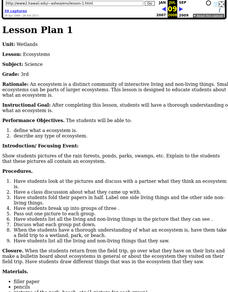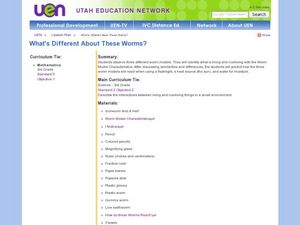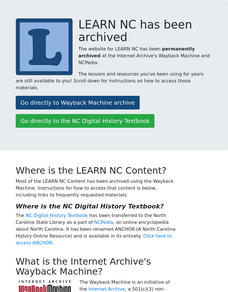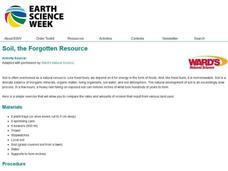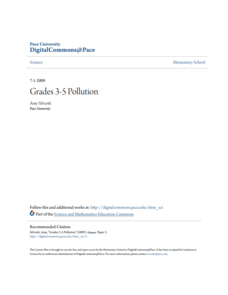Curated OER
Wetlands
Third graders examine how an ecosystem is a distinct community of interactive living and non-living things.
Curated OER
Three Worm Lesson
Third graders observe properties of three worms. In this living and non-living lesson, 3rd graders study characteristics of living and non-living worms. Students experiment to find how light, heat and moisture effects each of the worms....
Captain Planet Foundation
Sorting Out Soils
Sift through soil and learn about why it's important for organic processes. After discussing what makes up soil, such as the living organisms and what types of soil have more nutrients, kids sample layers of mulch and deeper soil to...
Curated OER
Plan, Do, Review...What's Bugging You?
Students explore insects through literacy, In this literacy lesson, students discover the characteristics of ladybugs and gain information from the text, "The Grouchy Ladybug". Students go on a "bug hunt".
Curated OER
The Needs of Living Things
Students investigate the global food chain by creating a visual chart. In this ecology lesson, students discover the elements needed for life to sustain itself, contrasting living things vs. non living things. Students fill in a...
Curated OER
What Makes a Dog a Dog
First graders recall and verbally list the parts of a dog, or a chosen subject, based on observations using the senses. They discriminate between living and non-living subjects, and create artistic representations of the parts of a dog.
Curated OER
Cricket Wars
Third graders explore living and nonliving things in a garden environment. In this garden environment lesson, 3rd graders study the effects of crickets in a garden. Students explore the interaction between living and nonliving elements.
Curated OER
Wonderful Worms
Students identify living and non-living things and explain the importance of earthworms to the soil. They name some basic facts about earthworms, recognize basic worm vocabulary words and demonstrate vermicomposting techniques.
Curated OER
Endangered Species
Students watch video clips of endangered animals. They imagine a small garden in front of a house and describe the living and non-living things that could interact to make up a garden eco-system.
Curated OER
Soil, the Forgotten Resource
Learners discuss soil understanding that is is often overlooked as a natural resource. In this science lesson, students recognize that we depend on it for energy in the form of foods. Learners experiment with six boxes of soil to help in...
Curated OER
IDENTIFYING AND SORTING BEARS
Pupils study the difference between living and nonliving bears by classifying pictures of bears and placing them on the appropriate posterboard. Given pictures of bears, students recognize types of bears by placing the pictures correctly.
Denver Art Museum
The Poetry in Non-Events
The photograph, Nellie and her Italian Soda is viewed and discussed by the class. They are instructed to use the photograph as inspiration to write a poem about non-events, or things that are beautiful in every day life. Pupils use a...
Curated OER
Hey Diddle Diddle
Students discuss their needs to grow and be healthy. They listen as the teacher explains the definition of "organisms" and "nonliving" Students identify organisms in the classroom. They listen to and view a poster illustrating the "Hey...
Pennsylvania Department of Education
Animal Classes and Their Ecosystems
Students explore animal characteristics by participating in an environment identification activity. In this animal habitat lesson, students discuss a range of different wild life and the ecosystems that they are a part of. Students view...
Curated OER
Investigate Science Using Crayfish
Young scientists discover the importance of scientific investigation by observing live crayfish. They carefully observe the patterns of crayfish in different environments. Then they discuss their conclusions and define what all living...
Alliance Theater
The Jungle Book Post-Show STEAM Lesson
An ecosystem is really just the flow of energy through many different living organisms. A study of Rudyard Kipling's The Jungle Book leads to an environmental science activity in which learners study how various factors can affect...
Curated OER
Can You "Gas" What's Happening?
Learners examine gas production in "soil" samples through hands on activities and class discussions, to determine if the soil samples have contain living or non-living systems.
Curriculum Corner
Guest Teacher Plans (Grade 2)
Be prepared the next time you're in need of a substitute with a daily plan equipped with an assortment of activities covering subjects math, reading, word work, writing, and science.
K20 LEARN
It's Alive! Or, Is It?
Seems like a fairly simple question—until you begin asking your class! Get pupils acquainted with the characteristics of life through pairs classification, discussion, and scientific reading. The lesson plan, part of the K20 series, also...
Pace University
Pollution
Over the course of 10 days, scholars take a pre-assessment to place them in one of three leveled groups. Whole-class and in small groups, pupils take part in read-alouds, field trips, hands-on activities, and complete learning contracts...
Curated OER
Life Systems- Zoo Central
Students investigate the various aspects associated with living things while also concentrating on their basic needs. They explore the aspects of movement and growth in plants and animals. This is done through research and other...
Curated OER
Living, Non-Living Mobile
Students are introduced to the concept of living and nonliving organisms in general and participate in a starter activity where they build their own definitions of living and nonliving organisms.They sort organisms into living and...
Curated OER
Creating Nonviolence: A Theatre of the Oppressed Approach to Things Fall Apart
Eleventh graders analyze Ahimsa and complete activities for nonviolence. In this nonviolence lesson, 11th graders define violence and relate it to their lives. Students adapt prose into a dialogue to act out and analyze the violence in...
Curated OER
A Tree is an Ecosystem
Students make observations about trees. In this ecosystem lesson, students observe and record all living and non living things they find under a tree, look for birds nests, evidence of woodpeckers and take samples such as leafs, bark,...
Other popular searches
- Living and Non Living Things
- Living and Non Living Things
- Living vs Non Living Things
- Living Non Living Things
- Living Non Living Things
- Laving and Non Living Things
- Living Non Living Organisms
- Living vs. Non Living Things
- Living vs Non Living Things
- Lving and Non Living Things
- Living, Non Living Things
- Living/non Living Things


